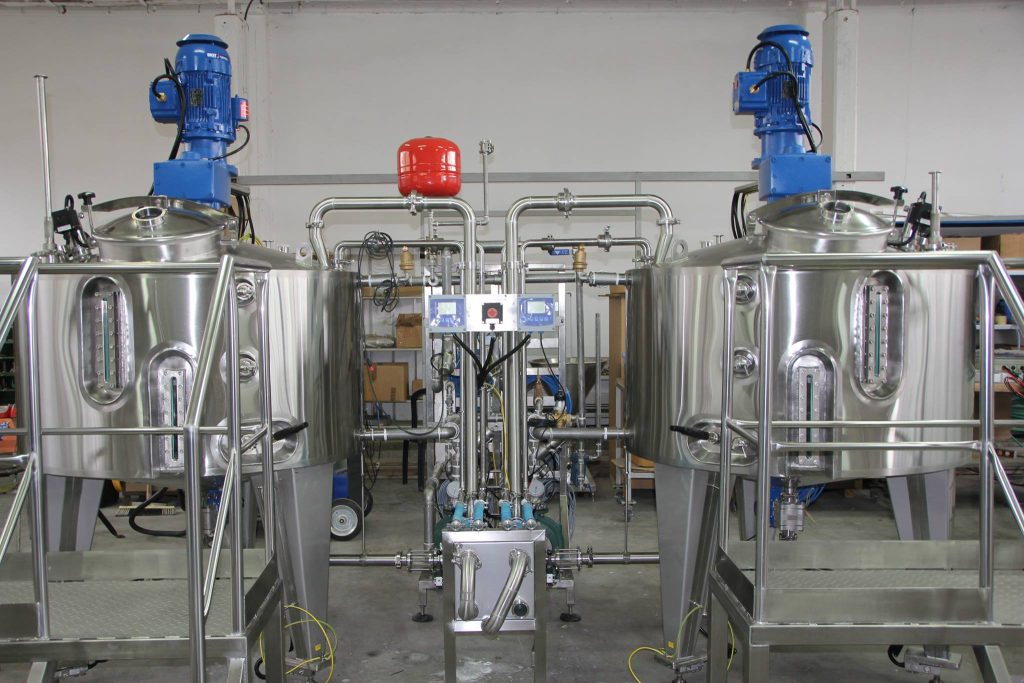Introduction

In the brewing industry, the quality of ingredients and equipment can significantly influence the final product. One essential piece of equipment that stands out is the stainless steel mixing tank. Renowned for their durability, efficiency, and sanitary properties, these tanks are the cornerstone of a successful brewing operation. This article will explore why stainless steel mixing tanks are ideal for brewing, focusing on their benefits, features, and overall impact on the brewing process.
The Advantages of Stainless Steel Mixing Tanks
Durability and Longevity
Stainless steel mixing tanks are celebrated for their exceptional durability. Unlike other materials, stainless steel is resistant to corrosion, rust, and oxidation. This longevity is crucial in brewing, where the equipment often endures various temperature and pressure changes. The following table illustrates the lifespan comparison between different materials used in mixing tanks:
| Material | Average Lifespan (Years) | Corrosion Resistance | Maintenance Requirements |
|---|---|---|---|
| Stainless Steel | 20+ | Excellent | Low |
| Aluminum | 10-15 | Moderate | Medium |
| Plastic | 5-10 | Poor | High |
| Glass | 5-10 | Fair | Medium |
Sanitary Properties
Sanitation is paramount in brewing. Stainless steel mixing tanks have non-porous surfaces that are easy to clean and sterilize. This reduces the risk of contamination, ensuring that the final product is of the highest quality. The ability to maintain hygiene standards significantly lowers the chances of off-flavors or spoilage, which can occur when using inferior materials.
Thermal Conductivity
Stainless steel offers excellent thermal conductivity, making it easier to maintain consistent temperatures during the brewing process. This property is particularly beneficial during fermentation, where temperature control is crucial. Effective temperature regulation leads to better flavor development and consistency in the final brew.
Versatility in Design
Stainless steel mixing tanks come in various sizes and designs, making them suitable for different brewing processes. Whether it’s a small craft brewery or a large-scale production facility, there’s a stainless steel tank that meets specific needs. The adaptability of these tanks allows brewers to scale their operations without compromising quality.
Cost-Effectiveness
While the initial investment in stainless steel mixing tanks may be higher than other materials, the long-term benefits outweigh the costs. Their durability reduces the frequency of replacements, and their low maintenance needs save money over time. Additionally, the energy efficiency of stainless steel tanks leads to lower operational costs.
Aesthetic Appeal
In addition to their functional benefits, stainless steel mixing tanks provide an attractive aesthetic to a brewery. Their sleek, polished appearance enhances the overall look of the brewing facility, creating an environment that is both professional and inviting.
Environmental Impact
Stainless steel is a sustainable material that can be recycled indefinitely without losing quality. By choosing stainless steel mixing tanks, brewers contribute to a more sustainable brewing process. This commitment to the environment resonates with today’s eco-conscious consumers, enhancing brand reputation.
Key Features of Stainless Steel Mixing Tanks
Construction Quality
High-quality stainless steel mixing tanks are constructed from 304 or 316 stainless steel, known for their strength and resistance to corrosion. The thickness of the tank walls also plays a critical role in ensuring structural integrity.
Insulation
Many stainless steel mixing tanks come with insulation options that help maintain temperature stability during brewing. Insulated tanks reduce energy consumption, contributing to cost savings and improved brewing efficiency.
Mixing Technology
The mixing mechanisms integrated into these tanks, such as agitators or paddle mixers, are designed for optimal performance. These technologies ensure that all ingredients are evenly mixed, resulting in a consistent final product.
Maintenance Tips for Stainless Steel Mixing Tanks

Regular Cleaning
To maintain the sanitary properties of stainless steel mixing tanks, it’s crucial to establish a regular cleaning schedule. Use a non-corrosive cleaning solution and avoid abrasive materials that can scratch the surface.
Inspect for Damage
Routine inspections should be conducted to check for any signs of wear or damage. Addressing these issues promptly will prolong the tank’s lifespan and prevent contamination.
Monitor Temperature and Pressure
Regularly check and calibrate the temperature and pressure settings to ensure optimal brewing conditions. This monitoring helps maintain product consistency and quality.
Conclusion
Stainless steel mixing tanks are a vital investment for any brewery looking to produce high-quality beer. Their durability, sanitary properties, and versatility make them the ideal choice for brewers of all sizes. By incorporating stainless steel mixing tanks into their operations, brewers can enhance efficiency, maintain quality, and support sustainable practices. The benefits of using these tanks far exceed the initial costs, ensuring a positive return on investment over time.
FAQ
Why are stainless steel mixing tanks preferred over plastic or glass tanks?
Stainless steel tanks offer superior durability, corrosion resistance, and sanitary properties compared to plastic and glass tanks. They also provide better thermal conductivity, essential for maintaining consistent brewing temperatures.
How do I choose the right size of a stainless steel mixing tank for my brewery?
The size of the tank should be based on your production volume and brewing process. It’s important to consider future growth as well, as a larger tank can accommodate increased demand without requiring immediate replacement.
Are stainless steel mixing tanks easy to maintain?
Yes, stainless steel tanks are relatively low-maintenance. Regular cleaning and inspections will help maintain their condition and performance.
Can stainless steel mixing tanks be customized?
Many manufacturers offer customization options for stainless steel mixing tanks, allowing you to select features such as size, insulation, and mixing technology to suit your brewing needs.
How do stainless steel mixing tanks contribute to sustainability?
Stainless steel is recyclable and durable, leading to less waste. By using these tanks, breweries can reduce their environmental footprint while providing high-quality products to consumers.

